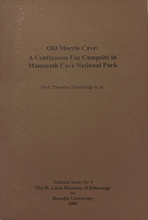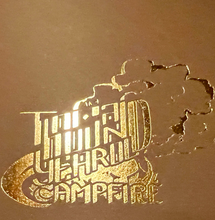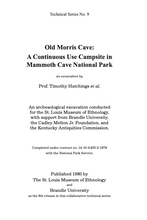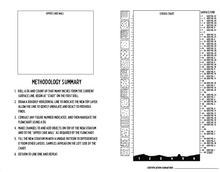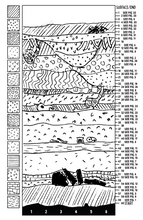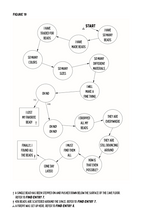
Thousand Year Old Campfire
or
Old Morris Cave: A Continuous Use Campsite
in Mammoth Cave National Park, an Excavation
in Mammoth Cave National Park, an Excavation
Thanks to Tim Hutchings, you will believe that a hole
full of broken pots and animal bones can make
you feel emotions.
full of broken pots and animal bones can make
you feel emotions.
-Anna Anthropy
I don't know if I know how to explain this, but I must try.
You are buying a game. The game is disguised as a particular sort of regionally produced archaeology journal which I used to see for sale in state parks when I was a youth.
In this solo game you are creating the results of an excavation of a cave mouth which has been a frequently used campsite for a thousand or more years. You do this backwards, building up history from the bedrock up.
You will roll a die and add dirt, building the cave floor upwards over time. At some points there will be archaeological finds 'uncovered'; you will operate a flowchart to learn about that find and how it came to be there. I am very proud of these flowcharts–some of them are, maybe, the best art I've ever made.
A flow chart might look like this:

You operate the flowchart and then add things to your strata schematic. In this case you would draw in beads and follow the procedure for making a long-dead campfire.
A finished strata chart might look like this:

I am inordinately happy with this game and am unable to do it justice here. Maybe I can rewrite this later and do better?
What are you actually buying?
• A soft-cover, digest-sized game booklet with 72 black and white pages. There's a flip through video in the thumbnails at the bottom of this page.
• Digital PDFs of the rulebook and two varieties of play sheet.
• Digital PDFs of the rulebook and two varieties of play sheet.
So what do you need to play?
• The game rules, of course
• a play sheet
• a six-sided die
• a pencil or pen
• a blue ballpoint pen (optional, really)
• 2-3 hours to spare, maybe more depending on how you play games
So what do you do?
• Roll a die to add layers to your strata chart, bottom to top
• Navigate flowcharts using that six-sided die
• Draw in the strata layers and the archaeological finds buried within
Drawing? Do I need to be an artist?
• Absolutely not.
Just to be clear: Is this a journaling game?
• Not in the 'write a page of text' sense. In fact, you'll write no words at all unless you count the signature you add at the end. You DO accrete and record information over time, but it is the form of the strata chart.
What do you feel?
• Each flowchart is a snapshot of something that happened in the past. These might feel purely utilitarian, frustrating, charming, melancholy, wistful...
Are there tricks?
• Yes. There is a layer of metatextuality on top of this that sweetens the game experience I think. It isn't vital to the play of the game.
Is it replayable?
• I think so! I'd guess there are at least three good plays in it. The random progression will give a reasonably different experience each time.
Do I have to do anything extreme?
• No? You don't have to mark in the book if you don't want to. You aren't expected to go out into the woods and hide your finished work in a hollow tree. I guess you can if you want to, though.
Is there really an Old Morris Cave?
• No, the cave is fictitious though some of the material in the game is true. There really is a Mammoth Cave State Park and the land the cave is imagined to be on really was once owned by a man named Valentine Simons. There is such a thing as processual archaeology and I did (mostly by accident) engage with it in a way that one of my reviewers thought interesting. There are things in game that are real in other ways.
A thousand years ago there were only Native Americans in the region. How do you handle that?
• I had two American Indian cultural consultants go over the text. They had good notes. I had an archaeologist go over it, too, and he specializes in the return of Native American human remains to their tribal groups–he had the most challenging responses of all.
Thank you Brian Sago and (unnamed paid consultant who disappeared and never formally gave me permission to credit them in any way). And thanks to Reno Nims, my archaeologist consultant!
Thank you Brian Sago and (unnamed paid consultant who disappeared and never formally gave me permission to credit them in any way). And thanks to Reno Nims, my archaeologist consultant!
Did anyone else work on this?
• Dr. Ezra Claverie was my editor. He nailed the tone of an academic journal while also herding the numerous cats that make up a set of rules, even those as simple as these. I recommend him highly to those in need of a word fixer upper. (Ezra would've told me to hyphenate 'fixer-upper' I bet, but this page is all me and my own word badness so I refuse.)
Is this like Thousand Year Old Vampire?
• Thousand Year Old Campfire is a descendant of Thousand Year Old Vampire, sharing themes and some mechanics. There is nothing supernatural in this game, it is definitely less intense, there are no single characters for which you advocate, there are no resources to track and spend. You do not need to have played TYOV to enjoy TYOC–it is a self-contained experience.
Are there any warnings associate with play?
• Yeah, I guess there are. There is animal and human death (but not graphic; we might learn that a bird flew into the cave, bonked its head and died). Certain unlikely paths contain themes of implied sexual harassment. I would be comfortable with a 12+ year old playing this game in the approved manner.
Is the PDF text-to-audio friendly?
• I don't think it is. The flowcharts have the text embedded in the image so an automatic reader probably can't detect it. If you need this service please email me at dearleadergame@gmail.com. But even then there is a flow chart aspect and a read-out-loud rework would need to be a whole new doc because of the direction arrows... If folks have thoughts on this please let me know–as a one-person shop I don't know how to best handle something like this.
Is there any errata I should know about?
• Gosh darn it yes there is. Figure 13 has a dagger reference that should point at Entries 9 and 10, not 8 and 9. This error is obvious and you'd've picked up on it if you'd bumped into it during play. All acknowledgements to K.F.





